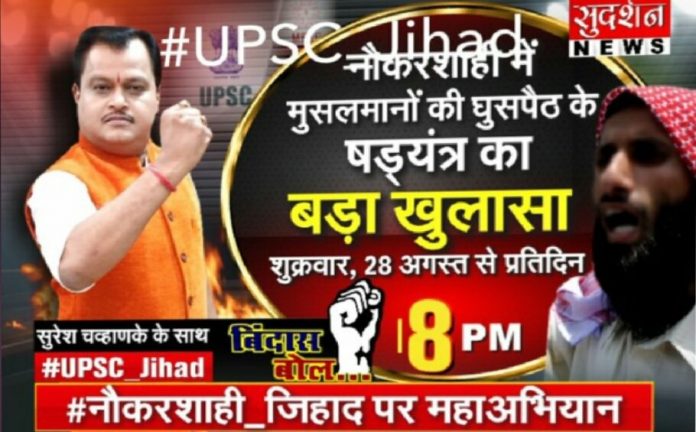In yet another case of hate speech, TV news channel Sudarshan news and its editor-in-chief Suresh Chavhanke have been rapped by the judiciary for broadcasting Islamophobic messages. The Supreme Court proceedings are still underway as the court hears the plea against the airing of the show that claims to be ‘a big expose on the conspiracy’ regarding Muslims ‘infiltrating government service’. The show was supposed to be aired on August 28th when a petition against it in the high court sought that its telecast be prohibited as the content of the show constitutes hate speech. Delhi HC Judge Justice Naveen Chawla at first ordered a stay on the show and issued a notice to the central government, the news channel and its editor-in-chief (who is also the anchor of the said programme Bindaas Bol). However, in view of the supreme court’s withholding of any pre-broadcast injunction against the show, the HC refused to put any restraint on the telecast. Meanwhile, the Union Ministry of Information and Broadcasting decided to allow the broadcast of the show citing the reason that no pre-censorship guidelines existed for a telecast on TV channels. The show went on to air four episodes of the controversial programme under the title “UPSC Jihaad”.
The programme had begun to draw criminal complaints on the basis of its promo trailer, even before the telecast took place. In the promo video, Suresh Chavhanke called those passing out of Jamia Millia Islamia’s Residential Coaching Academy (RCA) and clearing the Union Public Service Commission (UPSC) as “Jamia ke Jihadi”. The show was intended to run an investigation into the apparent link between terror organisations with islamist leanings and the UPSC coaching institutes. It also raises the baseless objection that muslims abuse their OBC quota and are given a relaxation of 3 years over and above OBC Hindus in the civil service exam. After the broadcast of the four episodes, the supreme court on September 15 directed the news channel to defer the broadcast of the programme. The court also called for the setting up of a five-citizen member committee with ‘no member of politically divisive nature’, that can come up with standards for electronic media’s reporting. The SC bench noted in its order that ‘the object of the programme is to vilify the Muslim community and make it responsible for an insidious attempt to infiltrate the civil services. We are duty bound to ensure adherence to the Programme Code formed under Cable TV Act’.
Implicating Zakat Foundation of India, the news channel alleged the Delhi based coaching NGO training UPSC aspirants of receiving funding from various terror-linked organisations. In the ongoing proceedings, the SC has asked the NGO if it wanted to intervene in the case, following the allegations by Sudarshan TV. The petitioners in the case include some present and former students of Jamia Millia Islamia University and seven former civil servants. The SC has struck the Sudarshan news programme for being “rabid” and “insidious” as it vilifies a religious community and casts aspersions on the Union Public Service Commission’s reputation without factual basis. On the other hand it responded with severe words to the defense of the counsels who presented the case for Sudarshan TV as freedom of press, speech and expression. The SC bench in response to this argument expressed that these freedoms are not absolute and that there is a need for journalists to be fair in their debates. Justice KM Joseph also indicated the need for a public disclosure of ownership of media channels.
As the trial continues, the central government, that is one of the respondents in the case, has on Wednesday written to the SC in an affidavit asserting that there is sufficient framework to regulate the print and electronic media. The affidavit stated that the SC should look into the functioning of the digital media and seek to regulate the web-based news portals, social platforms and OTT platforms that have a wider and faster reach. The centre urged that digital media should be brought under the banner of mainstream media along with the print and the electronic media. It further claimed that a broad precedent already existed for responsible journalism and therefore a general exercise of regulation of electronic media was unwarranted and impermissible, merely based on one or few episodes of the Sudarshan news channel. The court is yet to respond to the affidavit.








